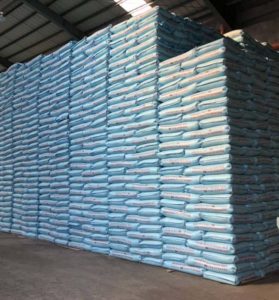 The Philippine government said there is no directive yet from President Rodrigo Duterte to suspend the importation of rice.
The Philippine government said there is no directive yet from President Rodrigo Duterte to suspend the importation of rice.
Finance Secretary Carlos Dominguez III and Presidential spokesperson Salvador Panelo issued the clarification in separate statements after GMA News’ 24-Oras Weekend on November 17 reported that Duterte had ordered the suspension of rice importation amid farmers’ woes stemming from the effects of the Rice Tariffication Law.
“As of this time there is no order to stop rice importation given the Sec. [William] Dar of the Department of Agriculture per the latter,” Panelo said in a text message.
Republic Act (RA) No. 11203, also known as the Rice Tariffication Law, took effect last March and shifted the country from quantitative restrictions to tariffs, leading to a surge in importation of the staple.
Local farmers, however, are pointing to the new law as the reason for the significant decline of palay or unmilled rice prices in some parts of the country.
Dominguez said that instead of suspending the measure, the government will grant “unconditional cash transfers to affected farmers” as approved in the last Cabinet meeting.
Close monitoring
The Department of Finance (DOF) said it is also closely monitoring potential distortions in the market, particularly the price gap between farmgate and retail prices.
“The gap between the per kilo retail price of regular milled rice and farmgate price of dry palay is widest in the provinces of Iloilo (P29.75), Zamboanga del Norte (P28.50), Negros Occidental (P28.01), Kalinga (P25.33), and Bulacan (P25.25). The average gap is around P22, as average retail price is P37.51 per kilo compared to dry palay farmgate average price of P15.71 per kilo,” DOF said.
Finance undersecretary Karl Kendrick Chua, who heads the DOF’s Strategy, Economics and Results Group, said the wide discrepancy between the farmgate price and the retail price of regular milled rice in some regions starting in October indicate a problem in the “middle supply chain,” referring to traders who have kept their imported rice stocks in warehouses to drive retail prices up despite abundant supply.
DOF assistant secretary and spokesperson Antonio Lambino II said DOF has received reports that some traders reserve warehouse space without storing anything in them, “so that they can put pressure on the farmers to sell at very low prices because the farmers now don’t have anywhere to put their harvest.”
Both the Bureau of Internal Revenue and the Bureau of Customs have formed strike teams to look into possible smuggling and hoarding activities, and non-compliance with tax and business regulations.
